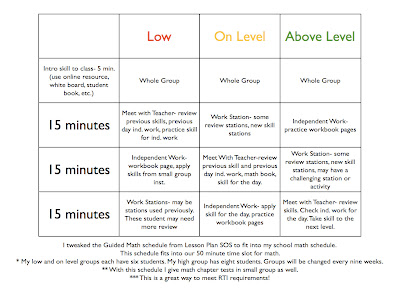Math Workshop Schedule
by Rowdy in First Grade
First 10 Days Detailed Lesson Plans:
These are detailed lesson plans used the for the first ten days of getting guided math up and running in your classrooms! Remember, as you implement guided groups, you will need to walk around and monitor the other students, making sure they have your desired behaviors during math workshop.
These are detailed lesson plans used the for the first ten days of getting guided math up and running in your classrooms! Remember, as you implement guided groups, you will need to walk around and monitor the other students, making sure they have your desired behaviors during math workshop.
It is very important that the students understand my expectations during small group instruction. So, at the beginning of the year, we create an I Can chart, just like from Daily 5. I ask the students to think about what they can be doing during math groups. I record their thoughts on chart paper. Then, I take their ideas and write them on a poster to display in our room. We review the I Can chart every day before math groups. It truly makes the students responsible for their learning and for their behaviors.
Resources Around the Classroom:
Here are a couple of attachments of posters and resources that I have created to post around our classroom that the children use as support during math time.
Here are a couple of attachments of posters and resources that I have created to post around our classroom that the children use as support during math time.
Teacher Station:At the teacher station, we play math games based on our math curriculum. I use an informal assessment form to record my observations.
Math Journals: Math journals are implemented to promote my students' problem solving skills. Our math journals are a special place where we record and store our math thinking. Some attachments are included to help you get started. These include lists of prompts and different components that you can add to your students' math journals. I print the math questions on labels, and the students stick them in each group's folder. I also write the problems on big chart paper that can easily hang by the table too. I make sure to model, model, model, model the math journal problems. We review the five components that I expect to see for every problem, which helps build my students' problem solving skills. They are Problem Solving, Representation, Reasoning and Proof, Communication, and Connections. |

No comments:
Post a Comment